May 13th 2009 saw an unlikely collection of boats
skippered by a mixed bag of rogues arriving at Pirates Cove restaurant
and marina in the sleepy town of Josephine, Alabama on the shores
of Perdido Bay. Contrary to most denizens of this laid-back bar
and restaurant, these skippers were not attracted by the famous
hamburgers but the prospect of covering 120 miles down the Florida
coast in small boats many without motors. They came towing an
odd assortment of production and homebuilt boats ranging from
a 10 foot homebuilt lapstrake beauty to 26 foot MacGregor sailboats.
In short, they came for the inaugural Florida 120 sailing event.
The Florida 120 is a raid-type event not unlike the Texas200
and other similar events. It is not so much a race as a challenge
for skippers to go 120 miles without depending upon a motor. This
particular event started in my mind as a warm-up to the more extreme
Everglades Challenge. Admittedly, it is just another excuse to
get together with like minded folks to sail the beautiful Florida
panhandle waters around Pensacola with the soft white sand beaches,
turquoise waters, steady breezes, and friendly dolphins. Much
to my surprise, 22 boats came.
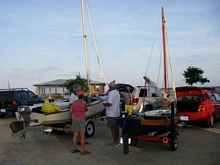 |
Wednesday afternoon saw the majority of skippers
and boats pulling into Pirates Cove with much admiring of
boats and talk about strategies going on. Pirates Cove got
a steady business from our group into the evening as we enjoyed
what we thought would be the last gasp of civilized luxury.
Pirates cove is a member of a bygone era in Florida history
with sand visible through gaps in the floor and a pack of
stray dogs wandering in and out making new friends. |
Some of the more interesting boats to look at included:
 |
• An aluminum Grumman canoe brought by
Levi sporting a colorful sail, amas made from PVC pipes normally
filled with cement and placed to ward off drivers from hitting
gas pumps, and the ends of the amas sealed with inexpensive
rubber playground balls. While not the fastest sailor, the
ability to easily motorsail with a paddle helped to keep up. |
 |
• A beautiful museum quality 10 foot lapstrake
sloop rigged dingy that proved to be quicker than the waterline
would suggest, built and skippered by Dylan. |
|
• My 12 foot blue catboat “Little
Gem” with a dodger cabin and a PVC bimini for shade
that surprised most with its good windward ability. Not a
trait normally associated with a beamy catboat. |
|
• One of the original wooden 16 foot Wayfarer
sailboats driven all of the way from Michigan by Gary and
one of the first boats to reach each night’s stop. |
|
• Mike in his SeaPearl which showed all
boats her pointy transom when off the wind. |
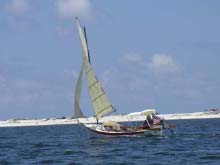 |
• A graceful Norseboat whose skipper,
David, made the most memorable picture when he rowed in light
winds despite having a motor hanging on the transom. |
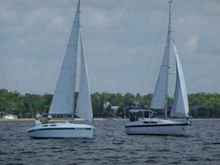 |
• Justin Pipkorn’s Just Right (pictured
on the left next to Sam’s Mac26s) proved itself once
again as a comfortable and swift boat on the water. |
 |
• Oaracle, who’s skipper and builder,
Oliver has taken on a couple of Everglades Challenge fame
and who lent his experience to the whole group. |
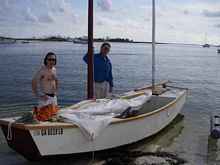 |
• Bill and Paul who launched their nicely
built Embers Watch for the first time during the 2008 Texas
200. |
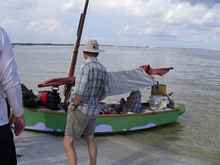 |
• Chuck and Sandra from Duckworks magazine. |
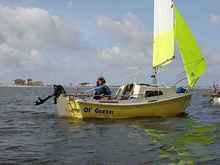 |
• Dan in his bright yellow Potter 14 “Old
Geezer” who drove all of the way from California to
join us and to do the BEER cruise. |
Thursday, Day 1
Thursday morning on a soft sandy beach behind the restaurant
we had our skipper’s meeting where the route was once again
laid out, the skippers were introduced, safety information was
exchanged, and everyone headed to their boats.
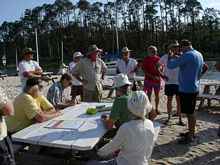 |
Soon after, many of us learned the fun of sailing
in Florida’s shoal waters when we ran aground on a hidden
shoal at the mouth of the inlet. The winds were light enough
that a quick shove with a pole, paddle or oar was enough to
get unstuck and most of the fleet progressed in majesty across
Perdido Bay towards the Perdido Key bridge. One or two notable
exceptions were some late-comers who were still launching
their boats including Andy who managed to bend the mast of
his Apollo sailboat on an overhanging branch. |
Some help from Chuck Leinweber of Duckworks magazine and some
leverage quickly had the bend out and he passed the rest of the
fleet. Bill and Paul, who had really only sailed their Ketch rigged
pram “Ember’s Watch” during the downwind sleigh
ride of the Texas 200 had to learn to make her go to windward.
They learned rather quickly and well!
The winds were light and on our nose at between 4 to 8 knots
which was enough for a pleasant tacking run across Perdido bay.
It was beautiful to see such a variety of boats and sails spreading
out as we each tested our relative speed. Some of the quicker
boats were able to stop for a nice lunch on a small sand island…no
palm trees though! The wind started dying off as the fleet approached
Perdido bridge. The narrowness of the passage combined with an
unfavorable tide and a light contrary wind proved to be the first
test of our sailing skills especially for the boats with no motors
on board. Now, it needs to be mentioned at this point that there
are four classes people could enter into for the Florida 120 which
are:
• Class 1: No motor on board
• Class 2: Motor contingency: motor onboard but only used
in an emergency
• Class 3: Limited motor: motor used only when absolutely
necessary
• Class 4: Unlimited motor: no restrictions
The goal of the Florida 120 is to move people from Class 4 to
Class 1 as they gain experience in handling boats without motors.
For the first Florida 120 we had 5 boats without motors all of
whom were challenged by the Perdido bridge. A few of the class
1 boats accepted tows from the Class 3 and Class 4 boats which
is allowed in the event rules under navigation hazard exemption.
A few of the class 2 and 1 boats did a heroic job of tacking back
and forth gaining a yard each time until they got out of the tidal
race. In particular I admired Mike in his Sea Pearl who must have
tacked 100 times before getting into wider waters. I unshipped
my oars and rowed like a demon to get under the bridge to a beach
under a “Welcome to Florida” sign where I absolutely
had to take a picture (and consequently gather my breath). Then
I tried making headway by tacking back and forth only to arrive
back at the same patch of beach every time. I finally resorted
to grabbing the painter on Little Gem and towed her along the
beach at Big Lagoon State Park until I was beyond the tidal race.
|
Once the fleet got past the narrow stretch by
Perdido bridge the waterway opened back up and the wind swung
just enough to have a nice one-tack sail to our first nights
stop at Sand Island (aka Robertson Island on Google Maps).
The south side of Sand Island is a wonderful stop for small
boats and powerboats alike. It used to be on a cove (misnamed
Mosquito cove) but one of the more recent hurricanes opened
a shoal water passage to the east and water rushes through
at the turn of the tide. Sand Island is not someplace you
want to be on summer weekends unless you want to Party with
a capital P. |
This is why we were stopping here on a quiet Thursday night.
Right across from Sand Island is the abandoned remains of Ft.
McRee which was the confederate’s fort on the eastern shore
of the Pensacola passage to the sea. On the other side of this
passage is much more extensive Ft. Pickens that is staffed. If
you plan on visiting Ft. McRee bring your bug spray!
As each boat sailed up to the landing at Sand Island the early
skippers let out a cheer and helped drag the boats onto the beach.
In relatively short order the whole fleet made it to shore after
at 20 mile first day run and the stories started flying about
the day as people set up their tents or sleeping accommodations
on their boats. Dinner was up to each individual skipper and varied
from cold snacks to elaborate meals cooked on the rail mounted
grills on the bigger boats. I prefer a simple repast of teriyaki
noodles supplemented by canned chicken. Once dinner was past,
we all adjourned to a fire where I shared some cautionary advice
about our next day sail, especially the crossing of the open passage
to the gulf. I also passed out a playing card to every skipper
for our poker-run which will be described more fully later. Andy,
who has significant experience in coastal sailing, assured us
that the tide would be high in the morning so many folks just
left their boats to dry on the beach confident that they would
be able to get going in the morning and turned in after a long
but rewarding day.
 |
 |
Friday, Day 2
Friday morning, in a pattern that would repeat for the rest of
the trip, skippers started popping out of their boats and tents
as soon as the sun appeared on the horizon.
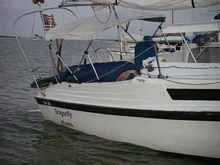 |
It was then that we learned that Andy had confused
high tide with low tide and a majority of the fleet was stranded
high and dry. Andy himself was tucked in his sleeping bag
practically falling out of the cockpit of Sam Hunter’s
MacGregor 26s. Fortunately, most of the small boats were able
to push off the sand and the tide floated the larger boats
late morning. Most of the small boats chose to sail out through
the shallow cut avoiding the larger channel frequented by
barges and in the wind shadow of Sand Island. |
|
Two boats, a Weekender built and skippered by
Pat (he wasn’t feeling well) and a Mayfly
14 skippered by Chuck and Sandra Leinweber decided
to head back at this point escorted by Charles and Isabelle
in their Compact SunCat. Charles and Isabelle would join us
later on Saturday after much thanks from Chuck and Pat. Friday
was one of our longer sails of 30 miles as the crow flies.
Unfortunately, we were in sailboats and had to sail a very
crooked path thanks to a contrary wind that plagued us all
of the way across Pensacola Bay. |
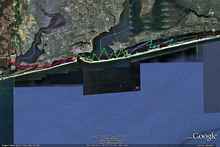 |
Add to this some wind driven chop and it was
hard for some of the boats to make much headway. Ray in his
Windrider Trimaran would fly across the bay on one tack and
then fly across on the other but making little headway despite
the speed. My 12’ catboat, Little Gem, with her beamy
hull found it hard going out in the choppy bay. I finally
resorted to sticking closely along the south shore of the
bay where the sandy spit of land blocked the waves but not
the wind. |
The passage under the Pensacola bridge proved much easier than
the Perdido bridge with most boats choosing to sail through. As
soon as I passed under the bridge I saw part of the fleet pulled
up on a beach in front of Surfburger, so I headed in that direction.
I found them on the balcony enjoying burgers and beer so I just
had to join in.
 |
One of the advantages of the Florida 120 is
the many different places along the route to re-supply, get
a hot meal, or just use a bathroom. Surfburger served two
of those functions wonderfully and provided a nice respite.
There were some boats that chose to keep sailing along Santa
Rosa sound missing this nice little stop. Once we all finished
eating and…well… we headed out onto Santa Rosa
sound. |
This sound runs about 20 miles along the Florida panhandle and
is a haven for small boat sailing with Santa Rosa national seashore
providing a sandy peninsula protection from the waves but not
cutting off the south breeze. There are shoal areas in this wide
body of water so shallow draft and small boats definitely have
a freedom not afforded to their larger deeper draft cousins.
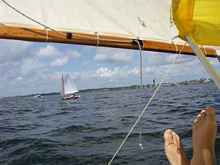 |
For the first little bit of Santa Rosa we had
to do some tacking but soon the wind shifted for a wonderfully
relaxing sail to Navarre. It was so relaxing, with my dodger
and Ipod playing tunes through speakers, that I found it rather
hard to stay awake. However, I did manage to steer a somewhat
straight course and arrived at the public beach at Navarre
under the big water tower. |
At this point I should explain that the goal of this second
day was a spoil island called Specter Island which is about 8
miles east of the Navarre bridge. However, the owner of Juana’s
bar and grill bribed us to stay with some free drinks and such
welcoming enthusiasm for our endeavors. He also reassured us that,
contrary to the rules, we would be fine setting our tents up on
the public beach.
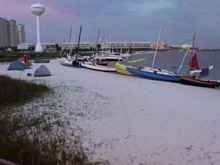 |
Add to this wonderful hospitality the close
proximity to a nice public bathroom and a Tom Thumb convenience
store for resupply and Navarre makes a wonderful mid-trip
stop. Next year the owner of Juana’s promised to put
a bird on the bbq for us so I guess we will be making this
our permanent turn around point. Hard to argue with hospitality
like that! |
The fleet came in much more spread out than on Thursday with
Levi in his Grumman canoe bringing up the rear of the fleet near
sunset. Most of us enjoyed a good meal at Juana’s and headed
back to the boats where we sat around talking and listening to
the music from Juana’s before tucking into our tents and
boats for a good night sleep. Once again, I passed out playing
cards to all of the skippers.
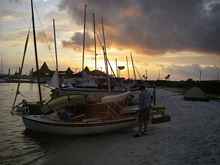 |
It was in Navarre where we started getting calls
from concerned loved ones seeing if we were surviving the
“bad weather” that was causing floods in nearby
cities. Ironically, we were living in a little blessed bubble
of good weather. We did see storm clouds around us that made
for wonderful sunsets and spectacular sunrises. |
Saturday
Once again many of the smaller and slower boats got going early
in the morning. Once again, Sam in his MacGregor 26s and Brian
in his MacGregor 26x were left high and dry by the low tide. For
the sail back to the west on Santa Rosa sound we were favored
with a light wind out of the east for a nice all-day reach. This
proved to be one of the better points of sail for the Sea Pearl,
Wayfarer, and Pat in his Laser which quickly left the fleet in
their wakes.
 |
Ray, on his Trimaran, had some success fishing
though, without cooler space, had to return the fish to their
native element. Some of the faster boats stopped again at
Surfburger for lunch again but I was unable to join them having
too little sail area on Little Gem to take advantage of the
light breeze. It was during this leg of the trip when I realized
why old fishing and pleasure boats in the age before good
boat motors had such large sails with so many reef points. |
When you don’t have a motor you want the ability to move
at a good pace in any wind mother nature decides to throw at you.
This means a large sail area for light wind days that can easily
be reduced in area for when the wind starts to blow. Most modern
boats have more modest sail areas in comparison having the luxury
of firing up the outboard on light wind days. One goal for next
year is more sail area!
When I reached Pensacola bay I found it very choppy due to weekend
boat traffic. By this time I was sailing in company with Levi
in his Grumman canoe and Dylan in his beautiful 10 foot boat.
All of us were challenged at times by the wake put out by large
powerboats who seemed determined to get an up close look at the
“little boats.” Levi, in his Grumman, was suffering
a bit from sunburn by this leg of the trip so had all his skin
covered up with pants and a long shirt, was wearing a camouflage
floppy hat, and had a camouflage handkerchief pulled up over his
face. He and I had a lot of fun steering through the hurricane
cut by Sand Island and sailing past all of the partiers in their
powerboats.
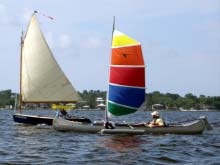 |
I went through first with a lot of drunken comments
being shouted at me all in good humor and some nice compliments
for Little Gem’s looks. Levi, behind me, elicited an
eerie silence from the same crowd who just didn’t know
what to make of him. In his head to toe camouflage and aluminum
Grumman canoe he might have looked like some sort of paramilitary
terrorist. |
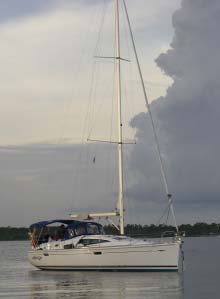 |
Shortly past Sand Island on the sandy peninsula
is a little cove known as Sailboat Cove. Mark Milan and family
were there to cheer us on from their beautiful new 40 something
footer boat complete with air conditioning. He later came
in his dingy to join us on shore and look at the odd collection
of boats. Sailboat cove was a relaxing stop with the waves
of the gulf only a short walk away. We found some driftwood
to build a warm fire around which we sat as Brett’s
sister sang us songs with her lovely voice. |
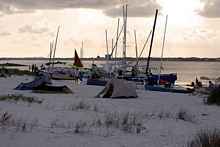 |
Brett and his sister sailed a surprisingly fast
Precision 16.5. After I passed out the cards to each of the
skippers, I asked everyone to share their most embarrassing
moment and the best lesson they learned from the trip. Many
of the stories involved one use of a bailing bucket on a small
boat and the inopportune approach of powerboats. One story
(skipper to remain nameless) involved discovering the porta
potty had leaked by tasting the water in the cabin of the
boat. |
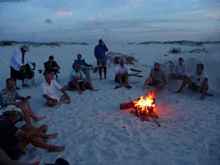 |
Mike made me feel really good when he said his
most embarrassing moment was not being able to pass my 12’
Little Gem in his 21’ SeaPearl to windward. Who says
a catboat can’t go to windward! Andy, of course, brought
up his mistakes on reading the tide. This was possibly the
latest we stayed up I think because we realized this was the
last night of our odyssey. We turned into our boats and tents
and watched the lightening flicker in the ring of clouds around
our good weather bubble. |
Sunday, day 4
Most all of the fleet left very early Sunday morning wanting
to get back to Pirates Cove with enough time to put the boats
on trailers and drive home. Also, the ominous clouds and worsening
weather reports spurred us all on. We had some wind for the sail
through Big Lagoon where the pod of dolphins who lives in the
area serenaded us goodbye. However, as most of the boats approached
Perdido bridge the wind slowly died. Those of us with motors cranked
them up with the exception of David in his Norseboat who rowed
despite having an outboard on his transom. Those of us with no
motors either accepted a tow (partly with an eye towards the threatening
sky) or rowed sailed. I kept company with Oliver in Oracle as
we both alternatively rowed and then tried to catch the falling
breeze in our sails. I think I rowed at least 8 miles of our 15
mile trip that day. Dylan, in his 10’ dingy, was one of
the first class 1 boats to reach Pirates Cove both because he
started earlier than most of us and got the most out of the morning
breeze and because his boat rows so nicely.
 |
Dolphins |
 |
Becalmed |
When boats arrived at Pirates Cove the skippers quickly grabbed
cars and trailers in order to get their boat out of the water
ahead of the weather as our bubble of good weather collapsed.
As each skippered finished getting all ready to go, including
showers at Pirates Cove facility for some, we trickled into the
laid back confines of Pirates Cove restaurant for our last lunch
together. As the skipper’s came in the pile of booty for
the poker run started to grow. Booty included things of value
that the skippers had little to no use for themselves. Included
in the pile were two titanic sized portholes, a bottle of monkey
butt powder, a solar panel, an odd assortment of parts, and etc…
I want to explain the nature of the poker run for the Florida
120. I started with a couple of combined decks of playing cards.
The skippers received one card at the 8am skippers meeting just
for showing up. They also received a card at each of our stops
along the way and another for arriving safely back at Pirates
Cove. In the restaurant I awarded some additional cards for Dan
for longest distance traveled (California!) to get to the event,
smallest boat for Dylan and his 10’, most unique boat for
Levi and his Grumman canoe, one for each skipper completing the
event in class 1, two cards to Charlie and Isabelle for escorting
the boats that turned back at Sand Island, and a card for the
most embarrassing story shared at Sailboat Cove. Charlie and Isabelle
shows that good deeds do go rewarded when one of the extra cards
they received gave them the best 5 card poker hand and they were
able to pick first from the booty. The funniest booty and skippers
match-ups were Levi who got the large portholes and promised to
show up with a boat he built around them for next Florida 120
and Pat, the Laser skipper, who gratefully picked up the bottle
of monkey butt powder.
As we all finished our lunches, said our goodbyes, thanked the
Pirates Cove crew for their hospitality, and piled into our cars
the first fat drops of rain began to fall. I met Dan the skipper
of Old Geezer at the BEER cruise two weeks later. He had chosen
to stick around to do the BEER cruise and had motored over to
another marina where a storm with high winds and rain trapped
him for the next several days.
All the future Florida 120 cruises will happen the weekend after
Mother’s Day which, for 2010, is May 13th to the 16th. See
you on the beach at Pirates Cove Thursday, May 13th at 8am. Visit
www.florida120.com
for more details and to register. There are no fees charged for
this event.
Many thanks to Ray, picture below in his Trimaran and with his
catch of day 3, for his work on the website.
*****

|

